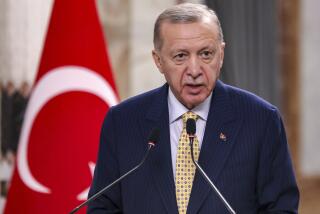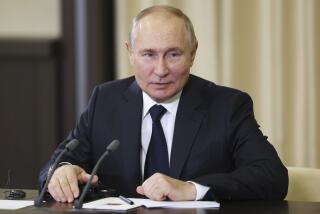Soviets Move to Widen Trade Ties : Joint Ventures With West, Full GATT Membership Sought
- Share via
MOSCOW — Soviet officials disclosed Friday that the Kremlin has made overtures to China, the West and the Organization of Petroleum Exporting Countries, in an apparent effort to broaden its economic ties.
Ivan D. Ivanov, the Foreign Ministry official recently named to oversee international economic relations, told a news conference that the Kremlin is studying economic reforms in China and considering entering joint business ventures with Western nations.
Ivanov also confirmed that the Soviets have asked to participate as an observer in negotiations next month under the General Agreement on Tariffs and Trade. He said that the Soviet Union wants to become a “full-fledged member” of the Geneva-based organization, which works toward reducing trade barriers between nations.
In the same briefing, Foreign Ministry spokesman Gennady I. Gerasimov said that Moscow has agreed, at Iran’s request, to cut its oil exports to the West by 100,000 barrels a day for the next two months, to aid efforts to stabilize world oil prices.
Gerasimov said he did not know what percentage of Soviet oil exports the reduction would represent or how it will affect Soviet earnings from oil sales. The move is intended to bolster OPEC’s attempt to reduce the current world oil glut, he said.
Iranian in Moscow
Iran, one of the oil cartel’s 13 member nations, has been pressing for deep production cuts to push prices up. Iranian Oil Minister Gholamreza Aghazadeh visited Moscow this week.
Ivanov and Gerasimov released few details of any of the proposed economic moves.
The efforts to expand economic ties with such a diverse array of nations appeared to signal a desire for a larger Kremlin role in world economic affairs. It coincides with a Soviet re-examination of political relations with other countries under Mikhail S. Gorbachev, Communist Party general secretary since March, 1985.
The Foreign Ministry has been reorganized and portfolios have been redistributed among the 13 deputies to Foreign Minister Eduard A. Shevardnadze. New desks have been set up in the ministry to deal with topics such as economic ties and disarmament.
One of the more visible policy changes has been an increased wooing of China, with whom Soviet relations soured in the late 1950s over ideology and border disputes.
Ivanov, asked whether any joint ventures with Western nations were in the offing, replied: “Such possibilities are being discussed in this country.”
He said that Soviet officials decided in June, after a discussion with businessmen from the United States, Western Europe and Japan--to set up a legal commission to analyze potential ventures.
In Washington, a State Department spokesman said: “We are interested in learning the details of just how the Soviets would intend to engage in such ventures. We know that, recently, they have shown considerable interest in such ventures with Western firms as a way to obtain Western capital, technology and access to management practices . . . .
“We will have to see it to believe it--that the Soviets really would let in significant Western management. They have not done that until now. . . . It remains to be seen just how serious they are about this.”
The decision to cut oil exports temporarily could help the Soviet Union, as well as other oil-producing nations, because the international oil glut has driven down prices for all exporters.
But the agreement with Iran also seemed to indicate a greater Soviet willingness to participate in international efforts to stabilize prices and to acknowledge the interdependence of national economies.
Ivanov was asked whether the Soviet Union was planning to join the International Monetary Fund.
“No contacts between the monetary fund and the Soviet Union are under way at present,” Ivanov said. Soviet involvement with the fund is unlikely, he said, in part because the fund uses U.S. dollars as its currency. The Soviet domestic economy uses only the non-convertible ruble.
Oil and gas sales to other countries provide the Soviet Union with most of its hard-currency earnings, which it needs to pay for imports of grain, computers and high-technology equipment for industrial modernization.
More to Read
Sign up for Essential California
The most important California stories and recommendations in your inbox every morning.
You may occasionally receive promotional content from the Los Angeles Times.













